
The Cook Islands are a self-governing island country in the South Pacific Ocean in free association with New Zealand. It comprises 15 islands whose total land area is 240 square kilometres (93 sq mi). The Cook Islands' Exclusive Economic Zone (EEZ) covers 1,960,027 square kilometres (756,771 sq mi) of ocean.

Rarotonga is the largest and most populous of the Cook Islands, with a population of 10,649, out of the country's total resident population of 17,434. Captain John Dibbs, master of the colonial brig Endeavour, is credited as the European discoverer on 25 July 1823, while transporting the missionary Reverend John Williams.
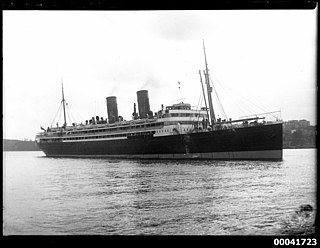
RMS Niagara was a transpacific steam ocean liner, Royal Mail Ship and refrigerated cargo ship. She was launched in 1912 in Scotland and sunk in 1940 by a mine off the coast of New Zealand.
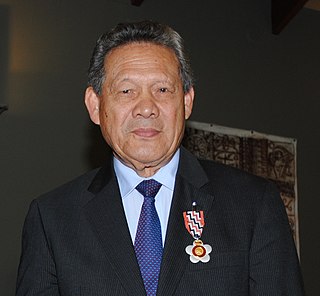
Joseph Williams was a Cook Islands politician and physician who served as Prime Minister of the Cook Islands for four months in 1999. He is credited with having worked to prevent the spread of the tropical disease lymphatic filariasis (elephantiasis). He principally resided in Auckland, New Zealand, where he was medical director of the Mt Wellington Integrated Family Health Centre.
Sir Thomas Robert Alexander Harries Davis was a Prime Minister of the Cook Islands and a medical researcher.

Albert Royle Henry was the first Premier of the Cook Islands. He was forced to resign from that post in a 1978 voting scandal for which he was later convicted of fraud. Henry was the founder and first leader of the Cook Islands Party (CIP).
Alfred Kura Taratu Ingram was a Cook Islands politician and Cabinet Minister.
Sir Pupuke Robati, KBE was a Cook Island politician. He served as Prime Minister of the Cook Islands from 29 July 1987 to 1 February 1989.
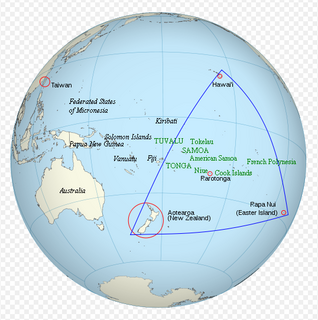
The Polynesian Leaders Group (PLG) is an international governmental cooperation group bringing together eight independent or self-governing countries or territories in Polynesia.
Teupoko'ina Utanga Morgan was a Cook Islands educator, politician and writer of children's books and song books. She was elected to the Legislative Assembly in 1961, becoming one of the first two women directly elected to the islands' legislature.
Poko Ingram was a Cook Islands chief, politician and community worker. She was elected to the Legislative Assembly in 1961, becoming one of the first two women directly elected to the islands' legislature.
SS Miowera was a passenger and refrigerated cargo liner that was launched in 1892 in England for Australian owners, and was later owned by two of New Zealand's foremost shipping companies. In 1908 her last owners renamed her Maitai. She was wrecked on a reef in the Cook Islands in 1916.

Tereora College is a secondary school in Nikao, Rarotonga, Cook Islands. It is the oldest secondary school in the Cook Islands and the national college of the Cook Islands for Year 9-13 students.
The Overseas seat was a Cook Islands electoral division returning one member to the Cook Islands Parliament. It was abolished in 2003.
Fanaura Kimiora Kingstone is a Cook Islands former politician and Cabinet Minister. In 1983 she became the second woman elected to the Parliament of the Cook Islands, and the first appointed to Cabinet.
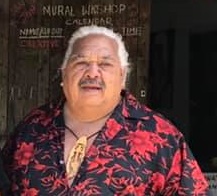
Mike Tavioni is a Cook Islands artist and writer. A master carver, he has been described as a taonga (treasure). His role in the pacific art community is recognised from New Zealand to Hawaii.
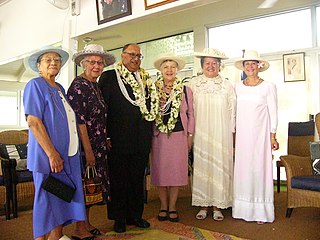
Margaret Makea Karika Ariki, also known as Pauline Margaret Rakera Taripo, was a Cook Islands ariki and holder of the Makea Karika Ariki title from 1949 to 2017. She was President of the House of Ariki from 1978 to 1980, and again from 1990 to 1992. She also served on the Legislative Assembly from 1958 to 1961.
Makiuti Tongia is a Cook Islands poet, academic, diplomat, and public servant. He is the first Cook Islander published in the Cook Islands, and considered to be a trail-blazer in Cook Islands literature and a key figure in the creation of a Pacific literary tradition.

The Para O Tane Palace is a historic building in Avarua, Rarotonga in the Cook Islands. Built in the 1830s by Makea Pori Ariki, it was later the residence of Makea Takau Ariki and the place where she signed a treaty making the Cook Islands a British protectorate in 1888.
Te Au o Tonga is a reconstruction of a vaka moana, a double-hulled Polynesian voyaging canoe. It was built in 1994 by former Cook Islands Prime Minister Thomas Davis and the Cook Islands Voyaging Society. It was used to teach polynesian navigation.










